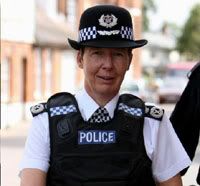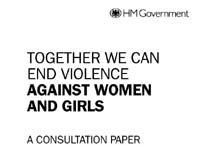 I was privileged (if that's the right word) to be invited to a seminar on responses to rape and domestic violence in Cambridgeshire recently, which was addressed by two speakers.
I was privileged (if that's the right word) to be invited to a seminar on responses to rape and domestic violence in Cambridgeshire recently, which was addressed by two speakers.The first speaker was from the Cambridge Rape Crisis Centre, which is the only rape crisis service in the UK to have shut down due to funding issues then reopened, due to the dedication and hard work of several Cambridge women in making small amounts from local sources (like the Cambridge University RAG) before the Government instituted a million-pound fund in 2008 to stop any more Rape Crisis Centres from closing. This fund was re-established in 2009, enabling a a £33,000 grant from the Government Equalities Office Special Fund in the face of "indifference" from Cambridge City Council to a request for funding.
Although prepared to believe that we have a long way to go as regards taking rape seriously, I was still surprised to learn that 17% of women over 16 are estimated to experience some sort of sexual victimisation.
Every rape is reckoned to cost the state around £76,000 in physical and mental health care, police and courts, and the long-term effects of self-harming behaviour such as eating disorders and/or substance abuse. Yet the monies it has received, which will keep it open until April 2010, boil down to £2.50 per caller. A wish-list for CRCC would include a budget big enough to allow a face-to-face service, and possibly also a befriending scheme, including accompanying clients to courts.
The second speaker was from the Cambridgeshire Constabulary Domestic Violence Unit, and had some hard truths to tell us.
Cambridgeshire Constabulary receives reports of 11,000 domestic violence incidents per year - which is 27% of all violent offences - the scary bit being that, on average, a woman will have been at the wrong end of abuse 35 times before she picks up the phone (and 80% of domestic violence incidents comprise a woman being victimised by a male perpetrator, although the Cambridge Rape Crisis Centre links to a website for male survivors of sexual abuse).
Every Police Force in England has a positive action policy on domestic violence: they will arrest an abuser found to be committing a criminal offence regardless of the victim's wishes, in order to lessen the likelihood of threats by the perpetrator.
An arrest will also be made if drugs are found on the premises; and although I am in favour of robust policing on drugs, in the area of domestic violence, including rape, one finds situations where women rely on drugs to block out the pain of what they are going through - possibly even being encouraged to do so. And sometimes it can be difficult to paint a picture of a habitual drug user in court with which a jury can feel sympathy. I felt I was bogged down in the quagmire of grey areas and hard decisions the police must be faced with every day.
 Another difficult area can be attitudes to women who stay with their abusers; the speaker related asking one police officer who questioned why abused women didn't up and go, "how would you put your life in a bag to leave forever in five minutes?" The officer addressing us was an energetic advocate of continuing training and reminding of the force in general and specially trained officers in particular. As Cambridgeshire Constabulary Chief Constable Julie Spence said earlier this year, "whilst I cannot guarantee that there has never been a time in any police force when an individual claim was not treated seriously, I know of no police officer worthy of their position who would treat [an allegation of rape] with less than absolute gravity".
Another difficult area can be attitudes to women who stay with their abusers; the speaker related asking one police officer who questioned why abused women didn't up and go, "how would you put your life in a bag to leave forever in five minutes?" The officer addressing us was an energetic advocate of continuing training and reminding of the force in general and specially trained officers in particular. As Cambridgeshire Constabulary Chief Constable Julie Spence said earlier this year, "whilst I cannot guarantee that there has never been a time in any police force when an individual claim was not treated seriously, I know of no police officer worthy of their position who would treat [an allegation of rape] with less than absolute gravity". Going beyond the seminar, I was interested to look through the Government consultation paper of March this year, due to report back to its stakeholders imminently, Together we can end violence against women and girls, which referred to the many positive achievements which have taken place in the last
Going beyond the seminar, I was interested to look through the Government consultation paper of March this year, due to report back to its stakeholders imminently, Together we can end violence against women and girls, which referred to the many positive achievements which have taken place in the lastten years, but stated early on that "Government alone cannot be the answer" to the questions we must ask about the continuing unacceptable rates of domestic violence in Britain.
But Government takes it on itself to provide answers; and in the case of the 32 rape crisis, survivors' and healing services to whom the Equalities Office Special Fund gave over £1,330,000 (€1,475,000/$2,175,000), thank God for it. London Mayor Boris Johnson looked to be leading the way in demonstrating the duty of councils to care for the most vulnerable in their areas by delivering on his manifesto commitment to increase the number of rape crisis centres in London, but unfortunately only two-thirds of the £2.23m in his manifesto commitment has been delivered. I can only hope for a rethink on this. Although the help given by these centres is and must be non-directional, it would be nice to
 see some Equalities Office monies going to charities who help women who wish to avoid abortion after rape, or deal with compounded trauma after abortion.
see some Equalities Office monies going to charities who help women who wish to avoid abortion after rape, or deal with compounded trauma after abortion.What I can't understand, though, is the disconnect sometimes apparent between promises and actions, even in this area that demands congruence between the two.
For example, the Dorset Echo's Miriam Phillips reports that a women's refuge is being closed by a quango called Supporting People on the basis that it doesn't also care for men, and women can be helped to live at home by outreach services. (The Cambridgeshire Constabulary website, like many other agencies, advises women on planning to leave.)

Alternatively, the ending violence consultation paper states, in a section called "next steps", that the government has taken a measure called the Gender Equality Duty (GED - one of 72 "Key achievements since 1997" listed in annex 3 of the documents) which "requires all public bodies in England, Wales and Scotland to take steps to promote equality of opportunity between women and men and eliminate unlawful discrimination and harassment in all their functions". So, what was the Trades Union Conference that's just finished all about - did delegates representing the highly-unionised public sector perhaps get their priorities wrong?
 Lastly, concerning Harriet Harman, who is among other roles the Minister for Women and Equality (and who, to her credit, is supporting the protests in Dorset against losing the women's refuge): while standing in for Gordon Brown during his holiday at the start of August, she spent more time defending ideological positions about the superiority of women to men (a concept I woulddn't argue about) that she never had time to dot i's and cross t's with Justice Minister Jack Straw and Home Secretary Alan Johnson on proposals to raise the percentage of successful prosecutions for rape.
Lastly, concerning Harriet Harman, who is among other roles the Minister for Women and Equality (and who, to her credit, is supporting the protests in Dorset against losing the women's refuge): while standing in for Gordon Brown during his holiday at the start of August, she spent more time defending ideological positions about the superiority of women to men (a concept I woulddn't argue about) that she never had time to dot i's and cross t's with Justice Minister Jack Straw and Home Secretary Alan Johnson on proposals to raise the percentage of successful prosecutions for rape.What we need is governmental interference where it is warranted, for example keeping women's refuge open in the face of hypertrophied quangocracy or forcing councils to shoulder their responsibilities towards vulnerable people, and minimal interference with police in terms of targets, tickboxes and form-filling, so that they can do the jobs they so manifestly want to do, among which are preventing future domestic violence and rape by showing the perpetrators of these heinous acts that there are less and less places to hide.
When clashes of egos and agendas are at risk of turning everything around into a sticky mess, we must never lose sight the Dorset campaign's assertion that in the vast majority of domestic violence cases its "women and children first".
Related post: It's a dog's life...











For one thing, if I were raped, the last place I would turn would be the government. ;o) Why can't the government offer assylum without trying to control every aspect? I have yet to see a government that can.
ReplyDeleteForgive me for saying so, but to prevent domestic violence, recognising equality is not what is needed. Surely, if a man sees his wife or partner as 'equal', as he might another man, then she is being set up for a fight. What he needs is to be taught (from youth) the proper elevation of a woman... to respect her and protect her.
I agree totally, Linda. We need a government over here thathas the humility to understand the difference between funding and controlling. And respect isn't spread by an agenda of sexualising children - for example, a leaflet given out to young teenagers by the NHS in Sheffield saying "an orgasm a day keeps the doctor away".
ReplyDelete